Menu

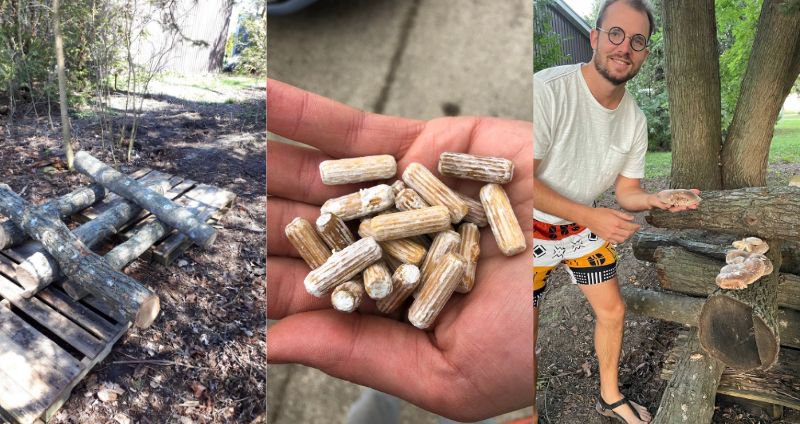

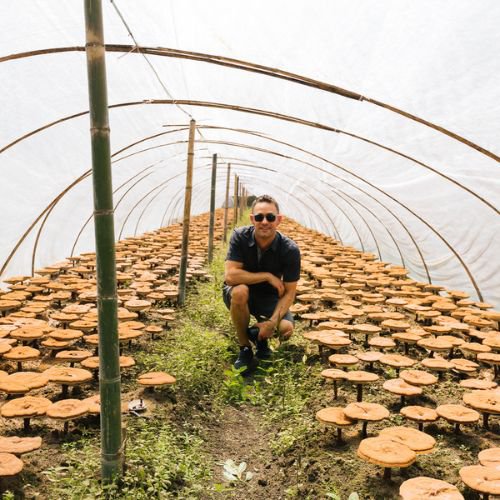
Did you know that growing mushrooms can boost your mental health?
Mushroom cultivation, also known as fungiculture, involves the careful cultivation and harvesting of various mushroom species. Dating back to 500 A.D., this practice leverages the diverse uses of mushrooms, from culinary ingredients to agricultural compost [6].
Besides the practical benefits of consuming functional mushrooms, growing mushrooms can also bring positive psychological effects. Recent studies suggest that cultivating and harvesting mushrooms can positively impact mental health, contributing to stress relief, mood enhancement, and overall well-being [19].
This primer will discuss the science behind these benefits, explore the process of mushroom cultivation, and provide practical mindfulness tips for those interested in starting their own mushroom garden.
Whether you’re a seasoned mycologist or a curious beginner, this comprehensive guide will provide valuable insights into the therapeutic potential of mushroom cultivation.
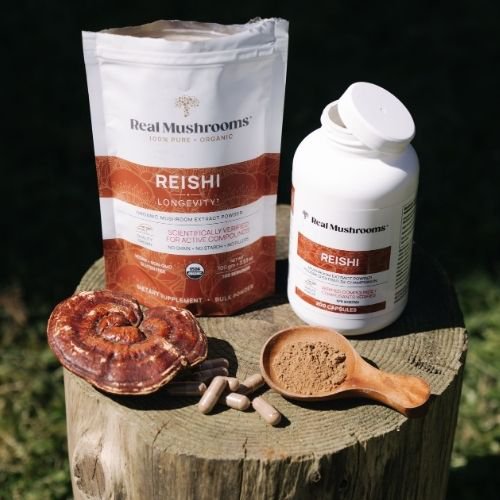
Fungiculture, as a form of gardening, offers various physiological and psychological health benefits [20]. It’s an activity that can lead to a deeper understanding of the self while connecting with nature.
Here are some ways engaging in mushroom cultivation can improve mental health:
The act of cultivating mushrooms can be a form of horticultural therapy, a practice that utilizes gardening and plant cultivation to improve mental health [1]. It can provide a sense of purpose and accomplishment, which can significantly enhance one’s mood and overall mental well-being [20].
A well-maintained body also has an impact on mental health. Gardening through mushroom cultivation allows a person to spend more time with nature and experience various physical benefits.
Generally, spending more time outdoors has increased benefits to physical and mental health. For example, people tend to take deeper breaths while outside. This may lead to improved digestion, immune response, and increased oxygen levels in the blood [20].
Receiving sunlight also has the added impact of potentially lowering blood pressure and increasing vitamin D levels [5].
From a psychological perspective, mushroom cultivation can be a meditative and mindful activity. The process requires patience, attention to detail, and a level of care that can help individuals stay present and focused.
The process of cultivating mushrooms can lead to reduced risk of depression, anxiety, and stress, while also potentially increasing feelings of relaxation and positivity [19].
Fun Fact: Whether you grow them yourself or not, consuming functional mushrooms such as lion’s mane can improve mood and lessen occasional stress and anxiety.
Additionally, maitake and shiitake are believed to help balance hormones, which can impact mood and overall well-being.
The scientific community has shown increasing interest in mushroom cultivation's potential mental health benefits. Several studies have explored this connection, yielding promising results.
A study published in the Journal of Environmental Psychology found that engagement in gardening activities, including mushroom cultivation, can reduce stress and improve mood [8]. The study suggests that the nurturing aspect of caring for plants, including fungi, can foster a sense of accomplishment and positivity.
In another study published in the Journal of Health Psychology, researchers found that gardening could decrease cortisol levels, the hormone associated with stress [7].
While this study focused on general gardening, the principles can be applied to mushroom cultivation, given the similar nature of their growing and harvesting processes.
A study in the Journal of Therapeutic Horticulture found that horticultural activities, including mushroom cultivation, can enhance feelings of calm and relaxation, reduce feelings of stress and anger, and improve overall mental well-being [13].
Especially when initiated as a group activity, shared investment in growing a garden led to safe interaction among community members. This allowed positive relationships to develop through commonalities found from casual to deeper conversations while tending to the garden [13].
The process of nurturing a fungal organism from a spore to a mature mushroom can provide a sense of accomplishment and purpose. Mushroom cultivation requires patience, attention to detail, and a deep connection with the natural world, all of which are key elements of mindfulness practices [12].
The act of preparing the substrate, inoculating it with spores, and maintaining the right conditions for growth requires attention and focus to yield the best results. It requires the cultivator to be fully engaged in the present moment, observing and responding to the varying needs of growing fungi [12].
The slow and steady growth of mushrooms can serve as a reminder of the natural rhythms of life, encouraging cultivators to slow down and appreciate the process. This can help reduce stress and anxiety, promoting a sense of calm and well-being [12].
Caring for another living organism can foster a sense of responsibility and empathy, which are key aspects of mindfulness. It can also provide a sense of purpose and achievement, which can boost mood and self-esteem [19].
Cultivating mushrooms can be a powerful form of mindfulness practice, promoting enriched mental health and well-being [8, 19]
For instance, you can focus on the sensations of preparing the substrate, inoculating the spawn, or harvesting the mushrooms. This mindful attention to a routine task can help reduce stress and anxiety, promoting a sense of calm and focus [16].
To enrich your mushroom cultivation with mindfulness, consider embracing these practices for a more centered and reflective gardening experience:
Mushrooms are powerhouses of nutrients and unique compounds that can influence brain health and emotional well-being [17]. Among the many varieties, certain functional mushrooms stand out for their ability to provide specific health benefits.
Here are some mushroom species you should consider growing in your mushroom garden:
Lion’s mane is renowned for its potential neuroprotective effects [21]. This mushroom can stimulate the production of nerve growth factor (NGF), a protein that promotes the growth and maintenance of neurons. This mushroom species can potentially support cognitive function and has mood-lifting properties.
Cordyceps is a type of parasitic fungus with potential adaptogenic properties. This means it can help the body resist different types of stress, including psychological stress. Some studies suggest that Cordyceps can help fight fatigue and low mood [15, 22].
Golden oyster mushrooms are rich in the amino acid ergothioneine. One human study using subjects who experience anxiety and sleep disturbances showed that consuming ergothioneine worked to decrease sleep difficulties [23]. Restful sleep is important to maintaining a steady, positive mood.
Research has shown promising results in using psilocybin, the active compound in these mushrooms, for its effects on various mental health disorders, including depression [14]. However, growing and consuming this mushroom should only be considered under professional supervision and in regions where it is legal.
Here’s a quick comparison table of these mushrooms for easy reference:
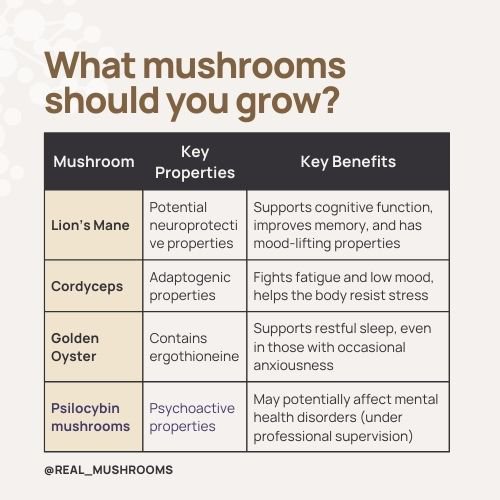
While these mushrooms have several potential health benefits, they should not replace professional medical advice or treatment. Always consult a healthcare provider before starting any new health regimen.
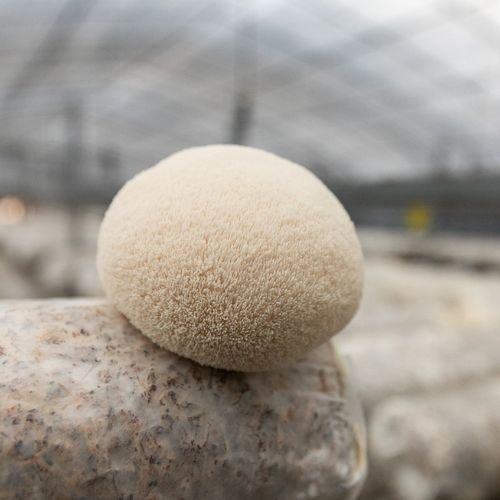
Mushrooms were historically collected through foraging, collecting them from their natural habitats in the woods [6]. In addition to this natural process of sourcing wild mushrooms, civilizations have developed different cultivation techniques, commonly known as TEKs in mushroom-growing communities, to grow mushrooms en masse.
Here are some mushroom cultivation techniques you can employ when growing mushrooms:
The PF TEK, or the Psilocybe Fanaticus Technique, was developed by cultivator Robert McPherson in 1992. It’s the best method for beginners because it uses common tools and materials and has a high success rate.
The PF TEK involves using a substrate mixed with two parts vermiculite and one part distilled water. This mixture is then combined with one part brown rice flour.
The PF TEK is easy to follow and generally inexpensive to do. However, it tends to result in lower yields and smaller mushrooms.
The bulk substrate TEK is ideal for more advanced cultivators. It involves using a container fully colonized with mycelium and adding high-nutrient fruiting substrate for a greater yield.
Bulk substrates are made from nutritious materials combined with pre-colonized grain spawn substrates. Common materials used in bulk substrate TEK include:
These are all mixed with distilled water in a large tub that reaches “field capacity” to ensure the substrate is fully hydrated.
This method is generally more tedious since it requires adjusting lighting conditions, humidity, and other variables. However, the end result of greater mushrooms to harvest makes it a viable choice for expert cultivators.
Log culture is the closest to foraging wild mushrooms in your backyard. It recycles forest waste and regenerates soil by being the substrate material for spores to grow in.
The log culture TEK is among the most eco-friendly options to grow mushrooms. However, it also has a relatively long cultivation process and can require almost one to two years before producing harvestable mushrooms.
Generally, mushrooms can take anywhere from a few weeks to several months to fully mature from the time of inoculation [3].
The timeline for mushroom growth can vary significantly depending on the species of mushroom being cultivated, the growing conditions, and the specific cultivation method used.
For example, an oyster mushroom has a relatively faster incubation rate (10-20 days on sawdust) than shiitake mushrooms (42-80 days on sawdust) [3].
The type of substrate used can also have a significant impact on the yield from your harvest. For example, sawdust-based substrates (from 10-80 days) allow for faster incubation than log-based substrates (from 4-12 months) [3].
Cultivating mushrooms, like any other hobby or activity, can have potential challenges. However, these instances are relatively rare and often associated with pre-existing conditions or improper practices.
Here are some potential risks and how they can be mitigated:
For beginners, the process of cultivating mushrooms can seem complex and overwhelming. It also requires patience and persistence as the different phases of mushroom cultivation can take weeks to months.
It’s best to start with easy-to-grow varieties and gradually move to more complex species as your confidence and skills develop. Utilizing resources such as guides, tutorials, and community forums can also help alleviate this stress.
Maintaining sterility is crucial in mushroom cultivation to ensure healthy growth and prevent contamination from bacteria, molds, or other fungi.
To achieve this, start with a clean environment and sterilize all equipment and substrates using methods like autoclaving or pressure cooking. Employ sterile techniques during handling, such as wearing gloves and using disinfectants.
Use high-quality spores or mycelium and monitor environmental conditions like temperature and humidity to minimize contamination risks. Regularly inspect for signs of contamination and act quickly if detected. By keeping everything sterile, you provide optimal conditions for mushroom growth and avoid potential crop failure.
Some individuals may develop allergies or sensitivities to certain types of mushrooms or the substrates used in their cultivation [10]. This can lead to physical discomfort, which can also impact mental well-being.
Always use protective gear, such as gloves and masks, when handling mushrooms and substrates, and be aware of any adverse reactions from the materials you’re exposed to.
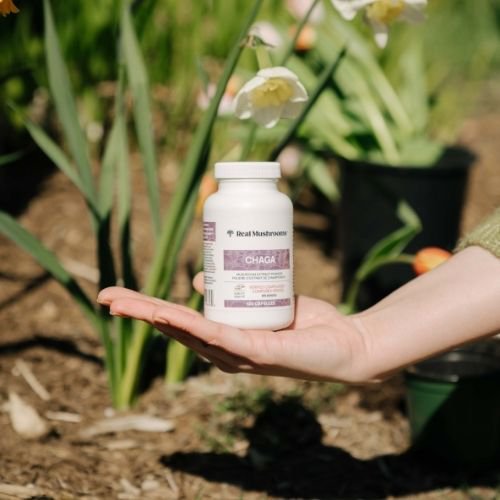
Cultivating mushrooms can significantly contribute to improved mood and mental health by helping with focus, encouraging mindfulness, and providing more time with nature.
Growing and harvesting certain types of mushrooms is particularly beneficial for mental health, with some functional mushrooms providing other health benefits. While anyone can start cultivating mushrooms at home, it’s important to understand the best conditions for mushroom growth and how to maintain a healthy mushroom garden.
Despite potential challenges, the risks are minimal and can be effectively managed. Cultivating mushrooms can indeed be a rewarding and therapeutic activity that promotes mental well-being.
If you want to experience the benefits of functional mushrooms but you don’t have the time to cultivate them, you’re in the right place. At Real Mushrooms, we provide a wide range of functional mushroom supplements made from 100% organic mushroom (fruiting body) extract to help you embrace a healthier lifestyle.

 .
.Disclaimer: The information or products mentioned in this article are provided as information resources only, and are not to be used or relied on to diagnose, treat, cure, or prevent any disease. This information does not create any patient-doctor relationship, and should not be used as a substitute for professional diagnosis and treatment. The information is intended for health care professionals only. The statements made in this article have not been evaluated by the Food and Drug Administration. Any products mentioned are not intended to diagnose, treat, cure, or prevent any disease. The information in this article is intended for educational purposes. The information is not intended to replace medical advice offered by licensed medical physicians. Please consult your doctor or health practitioner for any medical advice.